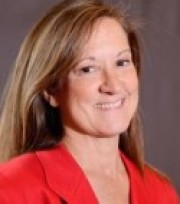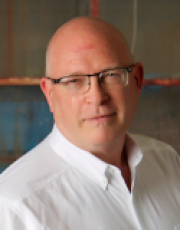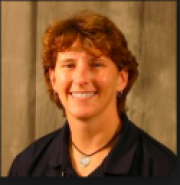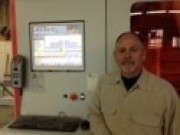Building Company CEO
Mentor – John Rupe, Jr.\
John Rupe, Jr. didn’t go to college with the idea of becoming an entrepreneur. In fact, he majored in political science and then landed jobs working for a Congressman, a building company, and a tech company – all before starting his own business. In a short 14-year time frame, John has built a large, diversified commercial real estate company. He started out constructing commercial buildings for clientele, and later went on to develop his own projects by building on land he acquired and renovating existing buildings. As his core business grew, John expanded his operation to include property management, leasing, and brokering the sale of commercial real estate. Rooted in core values of building trust, confidence and integrity, the company continues to grow and now has over 60 employees. Due to his success at an early age, John was invited to become a member of the Young President’s Organization (YPO), a group where members have achieved a high level of business success before the age of 45.
Work hard, play hard.
I went to high school in Palm Springs, California and pursued college at Arizona State University in Tempe. Like many college students, I didn’t have a good idea of what I wanted to do. I became interested in politics because of the 1992
Presidential election between Bill Clinton, George H. Bush and Ross Perot, and decided to major in political science. The greatest value of college for me wasn’t just my academic classes. Living on my own during those years taught me how to be independent. I had to create my own schedule and learned how to manage my time, along with simple tasks like doing my own laundry.
College also gave me the opportunity to meet people who shared my goal of wanting to accomplish something with our lives. I took full advantage of this environment and made friends and built social networks. I joined a fraternity, Sigma Chi, which was made up of good men who held you accountable to your goals. They expected you to do well in your studies and make good grades. They taught you what it takes to become a man with good moral values. The fact you can learn these kinds of values in a fraternity is an element not always understood by others when they think about college fraternities. But Sigma Chi, like other fraternities, had a culture much like a good business where you first work hard and meet your goals and then you play hard – which is the way I think life should be lived!
Unemployed and nothing to lose.
After I graduated, I was able to get a job working for a Congressman in Washington D.C through a contact I had made in college. I worked for the Congressman for two years, but I became disillusioned with politics and left. I moved back to California and got a job as a construction Superintendent and Project Manager. This is where I got a taste for building retail properties. I left after two and a half years to move closer to family in Tulsa where I secured a job with an Internet company that utilized a business model related to construction.
The tech company ultimately lost its venture capital funding after just one year, and I found myself out of a job with a family to support. I looked everywhere for another job and no one would hire me. I reflected back on my time at the California building company and it gave me the idea to launch The Rupe Building Company. I didn’t really have a choice. I had to do something to provide for my family. I only had limited experience in construction, but I owned nothing so there was nothing to lose. I taught myself how to read blueprints, read books on construction, and connected with people in the business. Overtime, my good work built confidence and trust with my clients, and a flood of referrals followed. For the first three years I worked by myself and did everything from construction supervision and accounting, to being the company janitor.
Then I hired my first employee.
My attitude towards hiring employees changed quickly. I first wanted to hire people as cheap as I could. However, I soon learned not to evaluate people based on dollars, but on if they believed in my company’s culture of building trust, confidence and integrity with clients. I needed to know I could trust the potential employee, and if they had the skills to perform the job.
Another thing I look for when hiring is people with a positive mental attitude. I can teach a person their job, but I have learned from experience that you cannot teach them attitude. My company now has property managers and assistant property managers, construction superintendents, project managers, commercial real estate brokers, accounting staff – and we all work together as a team.
Growth takes on many different faces.
As the building business grew, we also got into real estate development where we would buy vacant land and construct a building or renovate a poorly performing building. Later, we started managing buildings we constructed including leasing space, as well as real estate brokerage where we would primarily sell properties. Several years ago we merged our property management company with NAI to create NAI Petrous. Integrating these client services has advantages for the client and for us.
For example, the development company bought the Remington Tower, an office complex and well-known landmark property that had not been well maintained. We did the renovation with our own construction company, as well as the leasing and property management. The tower was 49 percent occupied when we bought it two years ago, and it is now 89 percent occupied and climbing.
We have also built a large variety of retail space, medical buildings, office space and light industrial. Here are links to browse our diverse group of recent projects:
http://rupeco.com/p-Tuscana-on-Yale.php
http://rupeco.com/p-Marquis.php
http://rupeco.com/p-OETA-pics.php
http://rupeco.com/p-LaFortune-Park-Tennis-Courts.php
We are building a legacy organization.
In 2010, I took on a business partner, Mark Helmer. That move helped the company tremendously, and we both work toward the common goal of making this a great company. As we grow the business, we are focused on building a legacy organization that will function without us. We continue to hire the best people we can find who have a positive attitude, fit our culture and who are 100 percent committed to helping grow the business. We provide flexibility for employees and don’t monitor the hours people work but trust they do their jobs at a high level of competency and on schedule. We are constantly looking at our benefits package that includes health care, vacations and family leave. We also plan team events throughout the year, beside just a Christmas party, as part of my “work hard, play hard” philosophy on life.
I am involved in a number of local community organizations. These include being on the Tulsa Day Center for the Homeless, Salvation Army, the downtown Tulsa Rotary, the Tulsa Community College Foundation Board and the Board of the YPO Tulsa Chapter. I believe it is very important in giving back to our community.
Keys to My Business Success
- I believe having a positive attitude is the most important personal attribute for a businessperson. You are not going to have a good day every day. No matter how tough things might seem, having a positive attitude will help you and your team overcome just about anything.
- Maintain a level of integrity in the way you deal with everyone. People do business with other people they like and trust.
- Success in business comes from building strong relationships with your clients. As your business grows, you have to make sure you build an organization where everyone fits into the company culture, which emphasizes building a foundation of trust, confidence and integrity when dealing with clients.
- Build a network of contacts beginning as a kid and constantly work on expanding that network as you navigate your career path. Good job and business opportunities are seldom advertised in the paper or online. You only learn about them by building relationships among a wide range of people in your community.
- Learn the basic accounting necessary to run your business. You don’t have to do the bookkeeping yourself; however, you need to know how to read a balance sheet and income statement, prepare budgets and know how to use accounting reports to evaluate how the decisions you are making are impacting your business.
- To run almost any business you need to build good relationships with banks, and in some cases, equity investors in either your company or your projects. Learn banks’ requirements to make a loan, and if bank financing and your own resources are not going to be enough to support the project, learn the kinds of returns on investment your projects must produce in order to attract outside investors.
The power of hard work, persistence, and a positive attitude.
I feel very fortunate for the success I have had building my business. I believe anyone with a good attitude and the determination to succeed can achieve almost anything. I had no money when I started and nothing to lose. This reality was a good thing for me, and motivated me to take the risk of starting my own business without any fear of losing anything. There are a lot of businesses like mine where you don’t need a ton of capital to start, but only the willingness to succeed.










